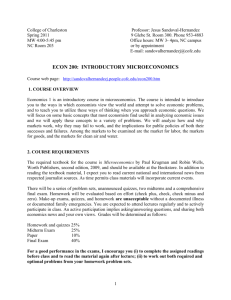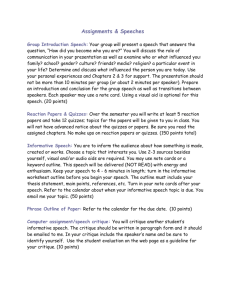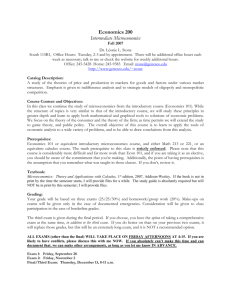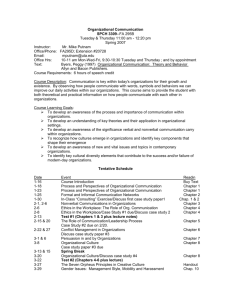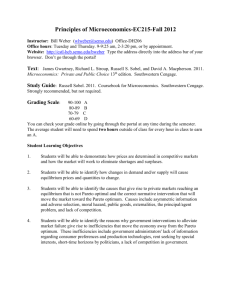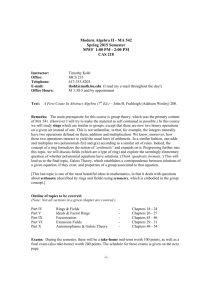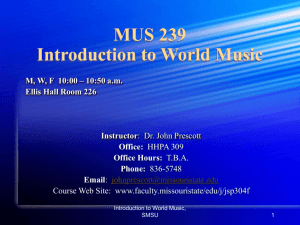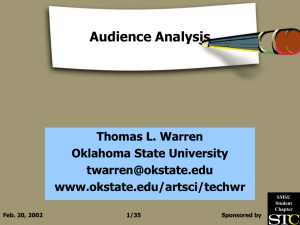principles of microeconomics - Southwest Minnesota State University
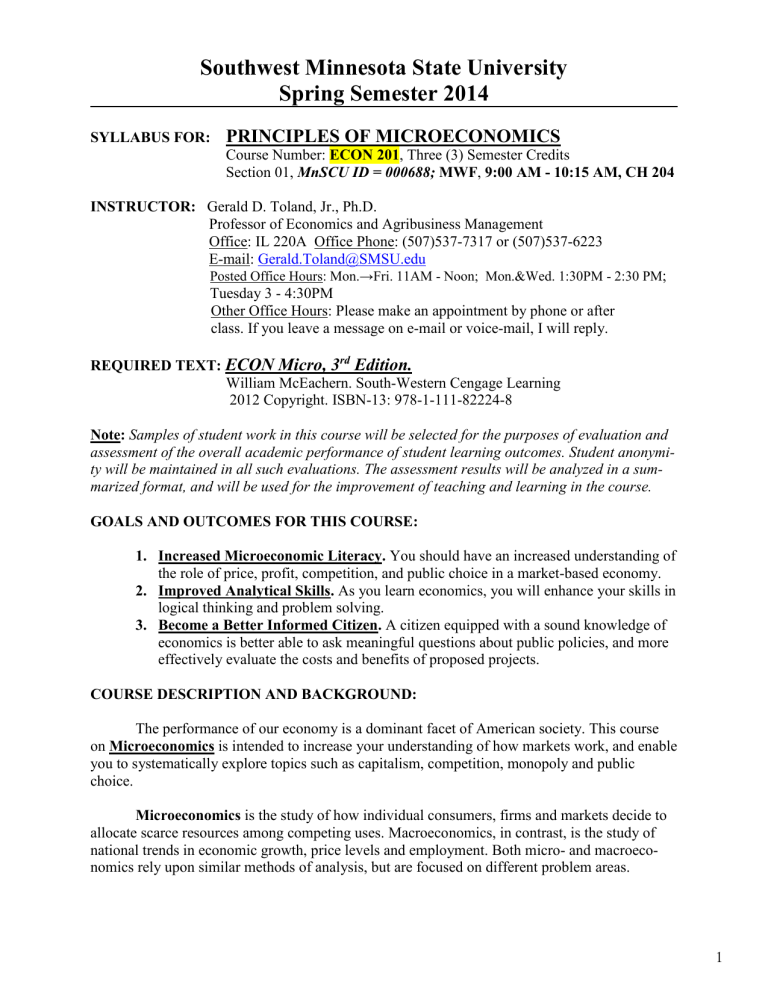
Southwest Minnesota State University
Spring Semester 2014
SYLLABUS FOR:
PRINCIPLES OF MICROECONOMICS
Course Number: ECON 201 , Three (3) Semester Credits
Section 01, MnSCU ID = 000688;
INSTRUCTOR: Gerald D. Toland, Jr., Ph.D.
MWF , 9:00 AM - 10:15 AM, CH 204
Professor of Economics and Agribusiness Management
Office: IL 220A Office Phone: (507)537-7317 or (507)537-6223
E-mail: Gerald.Toland@SMSU.edu
Posted Office Hours: Mon.→Fri. 11AM - Noon; Mon.&Wed. 1:30PM - 2:30 PM ;
Tuesday 3 - 4:30PM
Other Office Hours: Please make an appointment by phone or after
class. If you leave a message on e-mail or voice-mail, I will reply.
REQUIRED TEXT:
ECON Micro, 3
rd
Edition.
William McEachern. South-Western Cengage Learning
2012 Copyright. ISBN-13: 978-1-111-82224-8
Note: Samples of student work in this course will be selected for the purposes of evaluation and assessment of the overall academic performance of student learning outcomes. Student anonymity will be maintained in all such evaluations. The assessment results will be analyzed in a summarized format, and will be used for the improvement of teaching and learning in the course.
GOALS AND OUTCOMES FOR THIS COURSE:
1.
Increased Microeconomic Literacy.
You should have an increased understanding of the role of price, profit, competition, and public choice in a market-based economy.
2.
Improved Analytical Skills.
As you learn economics, you will enhance your skills in logical thinking and problem solving.
3.
Become a Better Informed Citizen.
A citizen equipped with a sound knowledge of economics is better able to ask meaningful questions about public policies, and more effectively evaluate the costs and benefits of proposed projects.
COURSE DESCRIPTION AND BACKGROUND:
The performance of our economy is a dominant facet of American society. This course on Microeconomics is intended to increase your understanding of how markets work, and enable you to systematically explore topics such as capitalism, competition, monopoly and public choice.
Microeconomics is the study of how individual consumers, firms and markets decide to allocate scarce resources among competing uses. Macroeconomics, in contrast, is the study of national trends in economic growth, price levels and employment. Both micro- and macroeconomics rely upon similar methods of analysis, but are focused on different problem areas.
1
A WORD TO THE WISE:
This course follows a logical sequence that starts with simpler assumptions and then proceeds to more complex analyses. Failure to understand the concepts at the beginning will have disastrous consequences later on.
If you do not understand something, it is essential that you ask questions. Office hours, telephones and e-mail are there for a purpose. Please use them.
THE COURSE PLAN:
Outline and Time Schedule for
Readings and Exams
Organization of Topics
I. INTRODUCTION TO ECONOMICS
Due Date for Readings
Pre-Course Assessment is due (worth 15 points)………….Jan. 17, 2014
A. Chapter 1. The Art and Science of Economic Analysis…..……………January 14
B. Appendix to Chap.1. Understanding Graphs…....………………….….January 16
C.
Chapter 2. Economic Tools and Economic Systems…………January 16, 21 & 23
**FIRST QUIZ** Covers Chap.1, Chap.1’s Appendix, & Chapter 2.
Given on Tuesday, January 28 th , 2014 .
D.
Chapter 3. Economic Decision-Makers……………..…..….…January 28 th
– Jan. 30 th
E.
Chapter 4. Demand, Supply & Markets………….……………February 4 th
, 6 th
& 11 th
**SECOND QUIZ** Covers Chapters 3 & 4. Given on Thurs., Feb. 13 th , 2014
II. INTRODUCTION TO THE MARKET SYSTEM
A.
Chapter 5. Elasticity of Demand and Supply………………February 18 th
– Feb. 25 th
B.
Review of Chapters 1 – 5 ……........………..………………..……….February 25 th
**FIRST EXAM** Covers Chapters 1 through 5. Given on Thur., Feb. 27 th , 2014.
Worth 100 points.
C.
Chapter 6. Consumer Choice and Demand………………..…March 4 th
– March 6 th
**SMSU Calendar Item**: March 10 - March 14 is Spring Break. No classes.
D.
Chapter 7. Production and Cost in the Firm………………..March 18 th – March 20 th
**THIRD QUIZ** Covers Chapters 6 & 7. Given on Tuesday, March 25 th , 2014 .
2
**SMSU Calendar Item**: April 15th is the last day to drop a course with a grade of W.
**SMSU Calendar Item**
Between 8:00AM and 5:30 PM on Wednesday, March 26,
2014 , SMSU has no classes scheduled because of Freshman/Sophomore/Junior/Senior Student
Advising.
Please contact your advisor on March 26 th
to plan classes for Fall Semester 2014.
III. MARKET STRUCTURE AND PRICING
A.
Chapter 8. Perfect Competition.........………………….……..….March 27 & April 1 st
B.
Chapter 9. Monopoly..............…………………………...………April 3 rd
& April 8 th
**FOURTH QUIZ** Covers Chapters 8 & 9. Given on Thursday, April 10 th , 2014 .
C.
Chapter 10. Monopolistic Competition and Oligopoly.……….April 15 th & April 17 th
D.
Review of Chapters 6 – 10........…....................................................April 22 nd
**SECOND EXAM** Covers Chapters 6 - 10 inclusive. Given on Tue., April 24 th .
Worth 100 points.
E.
Chapter 16. Public Goods and Public Choice...………………April 29 th
F.
Final Review………………..………..……..…………….…May 1 st
, 2014
Post-Course Assessment is due (worth 15 points) ……….…May 5
th
, 2014
******************************************************************************
FINAL EXAM
The Final Exam is comprehensive. It covers chapters 1 – 10, & Chap 15. This exam is worth 110 points, and will be administered on Thursday, May, 8 th . 2014, from 10:00AM to 11:50AM, for
Section 01 that normally meets on Tuesday & Thursday at 9:00AM.
******************************************************************************
IV. COURSE POLICY ON ACADEMIC DISHONESTY
Academic honesty is a requirement for passing this course. Any instance of academic dishonesty in this course will result in a failing grade for the entire course. Any student who fails the course in this manner will have no recourse other than to repeat the course again in a later semester. Academic dishonesty includes, but is not limited to, cheating on tests and/or assignments, plagiarism, lying to the instructor about anything related to the course, and any other student misrepresentation of his or her academic work.
3
V. GRADING
OVERALL COURSE GRADE
94% to 100%.............. of total possible points = A
90% to 93%.............. of total possible points = A−
88% to 89%.............. of total possible points = B+
80% to 87%.............. of total possible points = B
79%.............. of total possible points = B−
76% to 78%.............. of total possible points = C+
70% to 75%.............. of total possible points = C
69%..............of total possible points = C−
66% to 68%.............. of total possible points = D+
60% to 65%.............. of total possible points = D
59%..............of total possible points = D−
< 59%............. of total possible points = F
VI. EXAMS, QUIZZES, AND ASSIGNMENTS
The 2 midterm exams are worth 100 points each. The final is a 110-point exam.
There are also:
Four Announced Quizzes
Unannounced quizzes
Take-Home Assignments
Exams and quizzes will primarily have an objective format, including multiple-choice and truefalse questions. Tests may also contain written essays, where students must show that they know the material to receive full or partial credit. The purpose of this course is to develop your economic literacy. The tests are designed to assess the level of mastery that you have attained in microeconomic theory and its applications.
VII. THOUGHTS AND REMARKS ABOUT STUDENT AND FACULTY
RESPONSIBILITIES
I want you to know my policy on student-faculty interaction. In short, I believe students and faculty actively participate in a "learning contract." In this contract, students have the right to expect that a faculty member will create a high quality learning experience. In exchange, a faculty member has the right to expect a high quality performance from students. Faculty and students have a responsibility to abide by the conditions of this learning contract. I will do my best to live up to my part of the bargain, and I expect that all students who take this course to do the same.
Strive for excellence this semester. Make the most of your college years. Later in life, you'll have fond memories of SMSU and of the tremendous investment that you made in yourself.
4

